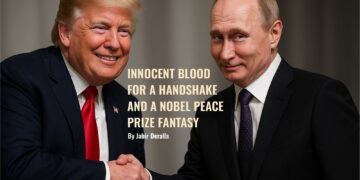By Jabir Deralla
It is long known that politics of appeasement only emboldens tyrants to pursue their bloody agendas and escape accountability. History is a persistent teacher, but too many leaders remain hopeless students. This piece is an attempt to amplify the voices that have learned the lessons, yet remain outside the corridors of power—voices demanding that democracy, human rights, and peace be defended with clarity and resolve.
Trump was never asked, invited, nor expected, to deal with Russian aggression against Ukraine—certainly not in the way he does. He invited himself and turned it into an election programme. Instead of standing with the victim, he pressures President Zelensky, disregards international law, and echoes Putin’s genocidal narratives, even openly blaming Ukraine for Russia’s aggression. This is not diplomacy, it is complicity. It is the rotten essence of Trump’s politics: vanity over principle, personal ambition over collective security, authoritarian instinct over democratic values.
He reduces a war of survival into a bargaining chip for his own headlines. By doing so, he hands the Kremlin legitimacy, undermines NATO, and signals to every autocrat that the United States can be played as a prop in their theater of power. This posture is not neutrality—it is surrender disguised as deal-making, a cynical transaction where truth, justice, and human lives are expendable in exchange for spectacle.
History has seen this before. The appeasers of the 1930s also claimed they were pursuing “peace,” while in reality they fed the ambitions of dictators and paved the road to greater carnage. Munich did not prevent war—it guaranteed it. Yalta did not secure justice—it divided Europe for half a century. Trump’s Alaska summit belongs to this same—if not worse—tradition of disgrace: spectacle, capitulation, and betrayal masquerading as statesmanship.
Appeasement neither began nor ended with Hitler. Too often, the Kremlin—whether tsarist, Soviet, post–Cold War Russia, or today’s Putin regime—was met with indulgence, appeased, or swiftly forgiven for its brutal wars and oppressive politics. European capitals that would never excuse such aggression from others repeatedly looked away when it came from Moscow. The empire was allowed to reset, rebrand, and re-enter the world stage, even as it carried forward the same imperial violence. Look honestly at history, and a grim mosaic of unfair concessions emerges—clear, undeniable, and deeply frightening.
Stalin’s Kremlin carved up Poland in the Molotov–Ribbentrop Pact, invaded Finland, swallowed the Baltic States, and commanded the genocidal Holodomor in Ukraine. After 1945, half of Europe was not liberated but handed over to Soviet tyranny, condemned to live behind the Iron Curtain for more than half a century. That, too, was appeasement—born at Yalta and sustained for decades, where “realpolitik” meant abandoning millions to dictatorship.
And this indulgence stretches back further. Tsarist Russia was repeatedly forgiven for its wars of conquest, its crushing of nations, and its ingrained antisemitism. Pogroms, deportations, and campaigns of ethnic persecution were tolerated as “internal matters,” while the empire was invited to sit at Europe’s table as though brutality were simply its domestic style of governance.
Nor did the pattern end with the fall of the Soviet Union. Post–Cold War Russia continued its bloody path: Chechnya, where entire cities were reduced to rubble; Georgia, where territory was carved out at gunpoint; Transnistria, where Kremlin-backed militias still strangle sovereignty; Nagorno-Karabakh, exploited as a fault line of instability; and of course, Ukraine—invaded, occupied, and bled for more than a decade. Afghanistan, too, remains a scar of Soviet imperialism, with over a million dead left in its wake. And in Syria, Russia erased Aleppo from the map, raining bombs on hospitals, schools, and civilians, all while the world’s leaders muttered about “dialogue” and “ceasefires” that never came.
The lesson is clear. To recall only Munich is to tell half the story. The Kremlin was not merely a victim of aggression; it was a co-conspirator, an architect, and a beneficiary of appeasement. Time and again, Russia was allowed to pose as partner or power-broker, while its victims were written out of the script. Trump’s conduct, from his very entry into U.S. politics to the so-called “historic summit” in Alaska, fits squarely into that same tradition—the politics of indulgence, complicity, and betrayal dressed up as pragmatism.
Europe’s Strategic Imperative
As underscored in Defending Democracy and Human Rights – Report and Policy Recommendations (March 2025), Russia’s full-scale invasion of Ukraine is more than a war for territory. It is a direct challenge to the post-WWII international order: the principles of sovereignty, democracy, and peace.
If aggression goes unchecked, authoritarian regimes worldwide will view appeasement as a license for imperial expansion. The question is stark: will Europe stand with Ukraine, or falter and allow tyranny to reshape the global order?
The publication put it clearly: The fight for Ukraine’s freedom is not just a fight for one nation’s sovereignty. It is a fight for the survival of the principles that have defined Europe for generations: democracy, peace, human rights, and the right of nations to determine their own futures. The outcome of this conflict will not only shape Europe’s future but will send a powerful message to the world about the values that will guide global governance in the 21st century and beyond.
Indeed, Europe’s response cannot remain fragmented or hesitant. The time for symbolic declarations has passed. What is needed is a comprehensive programme—firm, actionable, and sustained. Drawing on the Defending Democracy recommendations, and reinforced by recent European frameworks, the path forward includes a set of urgent and decisive actions to help Ukraine not survive, but to win.
Here are eight steps that need to be taken now, with no further delay:
1. Provide Comprehensive Military Aid
Deliver advanced weaponry without delay—air defense, artillery, long-range systems, armored vehicles. Intensify NATO coordination, training, and intelligence sharing. Delays cost lives; hesitation emboldens the aggressor.
2. Strengthen Economic and Humanitarian Assistance
Ensure Ukraine’s survival as a functioning democracy by expanding financial support for reconstruction, energy security, and infrastructure, while sustaining humanitarian aid and psychological recovery for victims.
3. Accelerate Ukraine’s Integration into European Institutions
EU membership cannot remain a distant promise. Negotiations must advance with clear timelines across governance, anti-corruption, and human-rights clusters. Integration is not charity; it is a strategic imperative.
4. Secure NATO Membership for Ukraine
Ambiguity is what invited aggression. At the Bucharest NATO summit in 2008, Ukraine was promised eventual membership—but the Alliance stopped short of delivering a clear path. That hesitation signaled weakness, emboldening the Kremlin and leaving Ukraine exposed. Today, as Ukraine defends not only its own sovereignty but Europe’s, its NATO membership is no longer a distant prospect but an urgent necessity. Membership is not a concession, it is a guarantee of lasting peace and deterrence. Europe and the U.S. must end the strategic limbo and extend to Ukraine the only security framework that has ever stopped Russian expansion: Article 5.
5. Enforce Accountability and Sanctions
Aggressors must face real consequences. Sanctions must deepen against Russia’s leaders, commanders, and oligarchs. The Special Tribunal for the Crime of Aggression (established June 2025) must be empowered, resourced, and supported by EU and NATO states.
6. Support Media and Civil Society
Free media and civil society are the first responders against propaganda. Europe must fund independent journalism in Ukraine and frontline regions, and reinforce civic networks across the Western Balkans and Eastern Europe, where Kremlin disinformation corrodes democracy.
7. Lead Diplomacy Without Appeasement
Diplomatic initiatives must uphold sovereignty and justice, not hollow compromises. This requires building global coalitions, reforming international institutions, and embedding accountability into any settlement. Peace without justice is not peace—it is surrender.
8. Mobilize Public Opinion
Europe’s citizens must be engaged. Public campaigns must make clear that defending Ukraine is defending Europe itself. Civil society, academia, and cultural institutions must counter disinformation and amplify the stakes: this is democracy’s frontline.
These are not abstract ideals—they are concrete steps, measured in weapons delivered, funds allocated, and laws enforced.
Appeasement of Russia—whether tsarist, Soviet, or Putin’s regime—has stretched across centuries, and it must end. Europe can no longer afford illusions or half-measures. The principles at stake—democracy, sovereignty, human rights—are not negotiable. Without democracy, the 21st century cannot survive.
If Europe chooses resolve, it will not only help Ukraine secure victory but also safeguard its own future. If it fails, it risks sliding into a new age of appeasement and authoritarian expansion.
The choice is historic. The time for action is now. Or kiss democracy goodbye.















